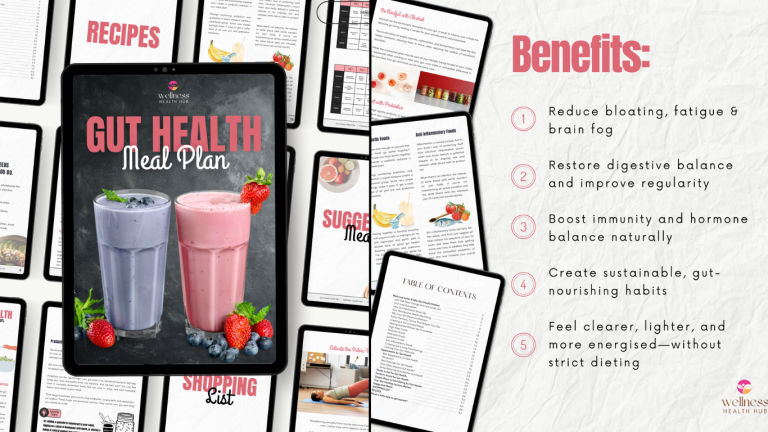If you’re reading this, you likely already know how pivotal your gut health is for energy, hormone balance, mood, immunity and digestion.
But here’s a piece too often overlooked: your medications can significantly influence your gut microbiome — for better or worse.
And when that microbiome shifts, your body’s rhythm can wobble: digestion slows, inflammation rises, energy wanes, your hormones feel out of step.
This is not about quitting your medications….. Far from it….
It’s about being empowered to support your gut ecosystem while you take what you need for your health, so you thrive rather than just survive.
What the Science Shows: Medications + Microbes
Recent reviews and meta-analyses illustrate a complex, bi-directional relationship between drugs and the gut microbiome:
1. Medications change the microbial terrain.
Studies show that not only antibiotics but many non-antibiotic medications — such as acid-suppressors (PPIs), antidiabetics (eg. Metformin), cholesterol-lowering drugs (statins), antidepressants and more — can alter gut bacterial composition and function.
In one landmark metagenomic study, researchers found that 24% of human-targeted drugs (i.e., non-antibiotics) affected at least one commensal gut bacterium’s growth in vitro.
These shifts can reduce microbial diversity, favour microbes that produce pro-inflammatory compounds and suppress those that maintain gut barrier integrity and metabolic harmony.
2. Microbes influence how drugs work.
The microbiome isn’t a passive bystander. It impacts drug metabolism, bioavailability and side-effect profiles. For example, gut bacteria can activate, degrade or transform medications, altering their effectiveness.
This partly explains why two people on the same drug dose may respond very differently. Your gut ecosystem matters.
3. The changes can be long term
Emerging data indicate that medication-induced microbiome shifts can persist for months or years — sometimes even after the drug has stopped.
That means your gut may carry the imprint of past treatments, influencing your digestion, metabolism and overall health in ways you might not immediately link to “that old prescription”.

4. There are real-life implications for hormone balance, metabolism and gut integrity.
When microbes that produce beneficial metabolites (like short-chain fatty acids) decline, your gut lining may weaken, inflammation may rise, and insulin resistance or weight gain may become more likely.
For mid-life women facing perimenopausal transitions, this is especially relevant: your hormones are already shifting, and your internal environment needs more stability, not more disruption.
What This Means For You — and What You Can Do Starting Today
Your gut is not just a digestive organ. It is a living ecosystem that influences your immunity, metabolism, nutrient absorption, inflammation, brain chemistry and mood. When medications shift the microbiome, your whole-body health can shift too.
Here are practical steps to protect and restore your gut health while still taking the medications you need:
Feed the beneficial microbes
A diverse diet leads to a diverse microbiome.
- Aim for 25–30 g of fibre daily from colourful vegetables, fruit, legumes, whole grains, nuts and seeds
- Add prebiotic foods that nourish beneficial bacteria including onion, garlic, asparagus, artichokes, oats, flaxseed and green banana flour
- Enjoy fermented foods such as unsweetened yoghurt, kefir and fermented vegetables
These foods encourage the growth of microbes that support digestion, brain health and metabolism.
Reduce what disrupts the gut environment
Ultra-processed food, refined sugar, excessive alcohol and chronic stress can compound the effects medications have on the gut.
Small shifts add up. Choose more whole foods, manage alcohol intake and include daily practices that calm your nervous system.
Support your gut lining
Some medications can increase intestinal permeability.
Include:
- Bone broth or collagen
- Zinc-rich foods like pumpkin seeds and seafood
- Polyphenols from berries, herbs and green leafy vegetables
These support the gut barrier that keeps the “outside world” where it belongs.
Consider targeted probiotics or microbiome-supportive supplements
Not all probiotics are created equal. Certain strains may help counteract the known effects of antibiotics, acid-blocking medications or metabolic drugs. This requires personalised guidance, because the right formula depends on your health history and symptoms.
Listen to your body’s signals
It is common to experience:
- Changes in bowel regularity
- Bloating or discomfort
- Increased cravings
- Brain fog or mood changes
- Skin irritation
These can be valuable clues that your microbiome may need more attention and support.
Don’t Wait For Your Gut To Get Worse
If your digestion, energy or mood has been sliding since starting medication, take control now.
Your microbiome won’t fix itself without support.
Get the Ultimate Gut Health Guide today
Inside this powerful, science-backed guide you’ll get:
• A 4-week gut-support meal plan
• Food lists to reduce inflammation and bloating
• Microbiome-boosting foods and habits
• Practical, do-this-now strategies that actually make a difference
This is not about stopping your medications.
It is about supporting your gut so you feel your best while benefiting from the medicines that help you.
Your gut is incredibly resilient when given the right care. If you feel your digestion, energy or wellbeing has changed since taking medication, this is a powerful place to start. With the right tools and personalised guidance, your gut can regain strength, diversity and balance.
I am here to support you every step of the way.
With warmth and science,
Teressa Todd
Naturopath | Biochemist
Ready to kick start Gut Health? Book a Call!

This is how gut microbes can influence weight!
Probiotics can help you gain weight or lose weight by interacting with our genetics, food and metabolism.
And yes, I did say lose or gain weight……..
Firstly, let me explain that the trillions of microbes in the gut need to be varied, meaning that there should be a large variety of species. There are many different species (or breeds) of microbes, and they all have their place in aiding health — the more variety and balance, the better health results.
Back to the weight loss or weight gain issue….
Do you eat yogurt and berries for breakfast? Thinking that it’s helping you lose weight?
Well, Lactobacillus acidophilus (like the species found in yoghurt) has been connected to weight gain.
I am not saying throw your yoghurt and berries in the bin. Instead, I am suggesting looking at the overall picture. If Lactobacillus acidophilus is the predominant micro-organism of the gut, then weight gain can result.
It is about the variety of species of gut microbes. Imagine if we only have trained german shepherd guard dogs in the world. It may be a safe world, but I am sure that other breeds may be more suitable as a family pet.
While Lactobacillus acidophilus is associated with weight gain, other Lactobacillus species correlate with weight loss.
Species like Lactobacillus plantarum, Lactobacillus gasseri, and Bifidobacteria animalis have been found to support weight loss.
Want to lose weight?
Look at your gut flora to support your goal.
Tests can be performed to identify the predominant species of the gut, and specific species can be utilised to support weight changes.
Want more information about your gut health?
Or want to look at all the factors contributing to weight gain, I’d love to be able to help.






